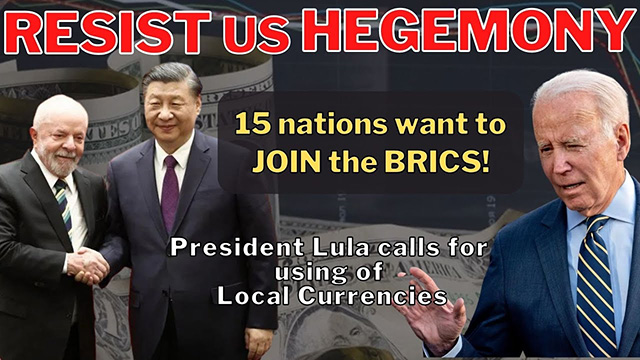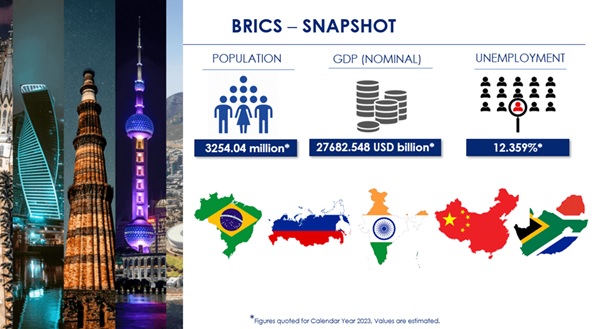
Who would have expected that the BRICS nations could rise as the potential rival of the G7 countries, the World Bank and the IMF combined? But that once seemingly distant possibility now has real prospects which could change the political equilibrium of world politics, writes “The Counter Punch’.
BRIC’s first official summit took place in 2009. Then, the discussion seemed largely abstract.
However, not until 2014 did BRICS begin taking serious steps towards greater integration, when the nascent alliance, now including South Africa, launched the New Development Bank with seed money of $50 billion. This decision meant that the group was now ready to take its first practical steps in challenging the dominance of the West over international monetary institutions, namely the World Bank and the IMF.
The geopolitical global conflict, thus shifts, resulting from the Russia-Ukraine war, however, proved to be the driving force behind the massive expansion underway at BRICS, especially as financially powerful countries began showing interest in the initiative. They include Argentina, UAE, Mexico, Algeria and, particularly, Saudi Arabia.
Recent financial reports suggest that BRICS is already the world’s largest gross domestic product (GDP) bloc in the world, as it currently contributes 31.5% to the global GDP, ahead of the G7, which contributes 30.7%.

One of the greatest opportunities, and challenges, facing BRICS now is its ability to expand its membership base while maintaining its current growth. The issue of helping new members maintain economic and political independence is particularly vital.
The IMF and World Bank are notorious for stipulating their monetary support of countries, especially in the Global South, on political conditions. This position is often justified under the guise of human rights and democracy, though is entirely related to privatization and opening markets for foreign investors – read western corporations.
As BRICS strengthens, it will have the potential to help poorer countries without pushing a self-serving political agenda, or indirectly manipulating and controlling local economies.
As inflation is hitting many western countries, resulting in slower economic growth and causing social unrest, nations in the Global South are using this as an opportunity to develop their own economic alternative. This means that groups like BRICS will cease being exclusively economic institutions.
The struggle is now very political.
For decades, the US’s greatest weapon has been its dollar which, with time, ceased being a normal currency per se, to become an actual commodity. Wars have been fought to ensure countries, like Iraq and Libya, remain committed to the dollar. Following the US invasion of Iraq in March 2003, Baghdad returned to selling its oil in US dollars.
This struggle over the dominance of the dollar was also painfully felt in Venezuela which has the world’s largest oil reserve, yet was reduced to abject poverty for attempting to challenge the supremacy of Washington its currency.
Though it will take time, the process of lessening the reliance on US dollars is now in full swing.
On March 30, Brazil and China announced a trade agreement that would allow them to use the two countries’ national currencies, the yuan and the reais, respectively. This step shall prove consequential, for it will encourage other South American countries to follow suit. But that move was neither the first, nor will it be the last of its kind.
One of the main decisions by finance ministers and central bank governors of the Association of Southeast Asian Nations (ASEAN) following their March 30-31 meeting in Indonesia is to reduce their reliance on the US dollar. They agree to “reinforce financial resilience… through the use of local currency to support cross-border trade and investment in the ASEAN region.” This too is a game-changer.
While the West is busy trying to keep its own economies afloat, it remains wary of the changes underway in the Global South. Washington and other western capitals are worried. They ought to be.
To argue that BRICS is a purely economic group is to ignore a large part of the story. The timing of BRICS’ expansion, the stern political discourse of its members, potential members and allies, the repeated visits by top Russian and Chinese diplomats to Africa and other regions in the Global South, etc., indicate that BRICS has become the South’s new platform for geopolitics, economy and diplomacy.
The more successful BRICS will become, the weaker Western hegemony over the South will grow.
Though some Western politicians and media insist on downplaying BRICS’ role in shaping the new world order, the change seems to be real and irreversible.
read more in our Telegram-channel https://t.me/The_International_Affairs

 10:14 26.04.2023 •
10:14 26.04.2023 •






















